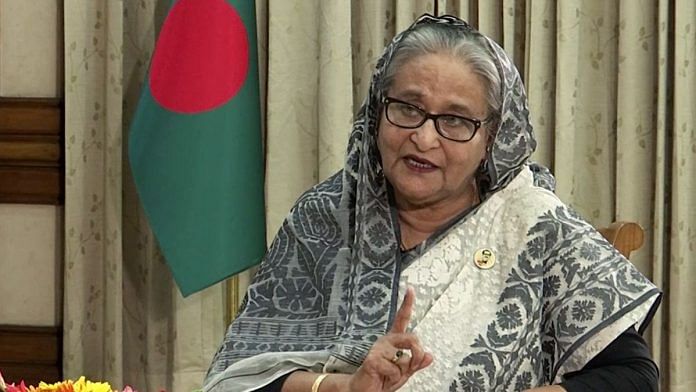The Indian saree has suddenly become political football in Bangladesh.
Kicking it around, the Opposition Bangladesh National Party (BNP) and the ruling Awami League (AL). The primary problem has been brewing for months, if not years. But with Bangladesh Prime Minister Sheikh Hasina herself rolling up her sleeves and joining the football match, New Delhi can no longer turn a blind eye to the rumblings on the eastern front that could turn Bangladesh into Maldives 2.0.
To recap: just after the January elections that Hasina swept and BNP boycotted, claiming the polls were neither free nor fair, a campaign surfaced on social media, emanating from Bangladeshis living in Europe and the United States.
The hashtags were exactly like the ones in the Maldives that forced India to pull out early March a first batch of troops from the island nation: #IndiaOut #BoycottIndia and #BoycottIndianProducts. Of course, India doesn’t have troops in Bangladesh. But the campaign’s primary beef is that New Delhi is backing the prime minister who is finishing off democracy, so #BoycottIndia.
Now, till last week, the campaign seemed to be all bark and no bite. Some of it was nasty. Modi and Hasina were targeted in the most unsavoury terms.
But since 20 March things have begun to go downhill.
Senior BNP leader Ruhul Kabir Rizvi publicly threw away a shawl he was wearing around his shoulders – an Indian shawl from Kashmir, some reports said – and gave the #IndiaOut campaign BNP’s blessings. Awami League leader Obaidul Quader predictably trashed BNP for it.
Battling ‘India Out’ with saree power
Had matters ended there, it would have been a case of much ado about nothing. But on 27 March, Hasina publicly declared war on #IndiaOut.
And her weapon of choice was the Indian saree.
“BNP leaders are saying #BoycottIndian products. But how many Indian sarees do their wives have? Why are they not taking away their wives’ sarees and setting them on fire?” she said at a party meeting.
Hasina further alleged that the wives and daughters of many BNP leaders often go and buy sarees in India and come and sell them in Bangladesh. “BNP leaders should make sure their wives don’t wear Indian sarees. The day you burn them (your wives’ Indian sarees) in front of the (BNP) office, that day I will believe you are actually boycotting Indian goods.”
BNP jumped down her throat. Rizvi retorted saying “BNP leaders don’t buy sarees from India that much. My grandfather’s house is in India. After I got married, I went here once. An uncle had gifted a saree. I asked my wife, where is that saree? She said she got a quilt made out of it and that too is now torn.”
Also read:
India must ask questions
Should Sheikh Hasina have joined the verbal battle on #IndiaOut? Should she have dignified a rabble-rousing social media campaign by commenting on it?
The bottom line is, the Indian saree has become a juicy bone in a regrettable dogfight and it is time for India to start asking questions like who is behind the #IndiaOut hashtag, first in the Maldives and now in Bangladesh.
The answer for anyone with even a lazy eye on subcontinental geopolitics: China.
The politics that brought the new Maldives President Mohamed Muizzu to power was his anti-India pro-China plank.
Hasina is unabashedly India’s best friend in the neighbourhood. But Delhi is hard put to match China’s deep pockets and big investments in Dhaka.
India knows it: Beijing is bent on challenging New Delhi’s natural primacy in the region. No wonder Prime Minister Modi has just doubled India’s assistance to the strategically located Bhutan from Rs 5,000 crore to Rs 10,000 crore.
Perhaps Dhaka deserves more attention. India can’t take Bangladesh’s loyalty for granted just because it helped the country gain independence from Pakistan in 1971. New Delhi must pull out the thorns in the flesh, no matter how inconsequential they seem.
Take the famed fine cotton Tangail saree. It became the subject of a tug-of-war between the two countries after India gave West Bengal the Geographical Indication (GI) for it in January. Dhaka was furious. Tangail is a district in Bangladesh. The saree takes its name from that district. How can India claim GI? Hasina was sore. She told the media she had only worn Tangail sarees during her visit to Germany as they were Bangladesh’s pride.
That may sound like a petty kitty party quarrel but see how the saree – this time the Indian saree – has returned to haunt the two countries. Sheikh Hasina has put the Indian saree centre stage in the #IndiaOut debate. By doing so, she may have inadvertently given the campaign against India the boost that it was waiting for. India can ignore the movement at its own peril.
The author is a senior journalist based in Kolkata. She tweets @Monideepa62. Views are personal.
(Edited by Zoya Bhatti)




Good that this issue is being flagged at an early stage. The India Out campaign in the Maldives received scant media coverage, till the change of government happened. 2. Apart from government to government relations, where perhaps we should not have very strong preferences, there is a need for India to be well regarded by ordinary citizens in neighbouring countries. Recall the blockade of Nepal in 2015.